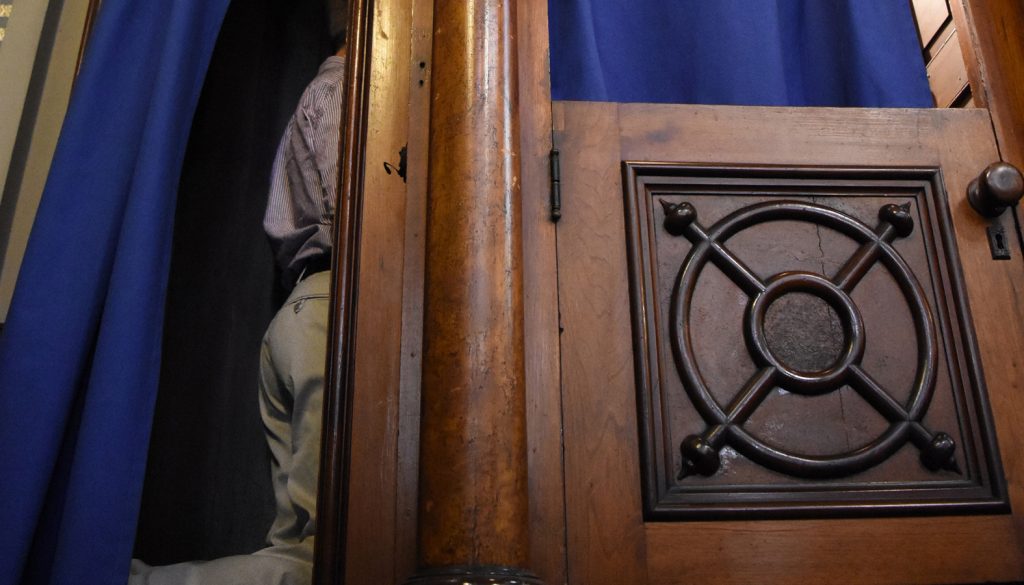One of my favorite inappropriate theology jokes goes like this:
Jesus comes upon a sinner who is about to be stoned by a mob. Jesus silences the mob by saying, “Let he who is without sin cast the first stone.”
Then from the back of the crowd, a boulder comes flying through the air and flattens the sinner.
Jesus turns around and with an exasperated voice, says, “Mother!”
Indeed, Mary is the only human that the Church says was born without sin and remained sinless. The takeaway, of course, is that all the rest of us are sinners. Every time we go to Mass, we are reminded of two things: We are sinners, and we are in need of God’s mercy.
I know Catholics who hated the old prayer, “Lord, I am not worthy to receive you. Only say the word and my soul will be healed.” One couple said they refused to say it because it was too negative. Yet in the Church’s wisdom (and our lived experience), it is just a fact: We are all sinners in need of salvation and forgiveness.
While this is a basic truth of our faith, which we profess at the beginning of every Mass, it can be difficult to accept. We like to point out the splinter in someone else’s eye, but we aren’t too crazy about confronting the beam in our own.
The parable of the Pharisee and the tax collector in Chapter 18 of Luke’s Gospel is a warning to all of us who like to sit in judgment of others. The Pharisee thanks God that he is “not like the rest of humanity — greedy, dishonest, adulterous.” He tallies up all his prayers and donations with a cold smugness. The tax collector simply says, “O God, be merciful to me, a sinner.”
Our pharisaical flaw is to think we have no flaw, thus making it impossible to receive God’s forgiveness and mercy, even as we point out the flaws of others.
This hypocrisy is an easy trap to fall into. Any “professional Catholic,” collar or no collar, must be particularly sensitive to the temptation to revel in decrying the sins of others and avoiding our own unworthiness.
Recently, a priest of some national stature was accused by a Catholic newsletter of using a gay hookup site called Grindr. While most Americans, and most Catholics, would hardly recognize his name, what did catch everyone’s attention was the fact the accusations grew out of user data purchased from Grindr, then de-anonymized to identify users. The same can apparently be done with data obtained from the heterosexual hookup app Tinder. An estimated 12 million combined users of these two apps are probably very interested in this revelation, since it is now clear that they, and for that matter almost anyone who uses almost any app, are more digitally transparent than they may have thought.
There is a great deal we don’t know about these allegations, though they have already cost this priest his job. No independent party has as yet examined the data sets that allegedly matched cellphone locations with specific hookup sites. We don’t know who funded what appears to be an expensive and lengthy investigation. We don’t know who did the actual research. We don’t know their agenda. We only know the accusations.
According to the Church rumor mill, there may be more revelations to come. Reports suggest that the plot is linked to disappointment over the revelations regarding the defrocked former cardinal, Theodore McCarrick, accused of gross sexual improprieties and now charged by the state of Massachusetts with having abused a minor.
As both moral theologians and Church historians would tell you, of course, exposing the sins of Catholics, churchmen or laity, is a fool’s errand of sorts, since all are sinners. Culling sinners from church rolls leads to empty churches, not holy ones. High-tech witch hunts lead to more distrust and suspicion, not less.
And having the wealthy laity as self-appointed inquisitors hunting down sinning priests and bishops is an unwelcome precedent, whatever self-righteous gloss is applied to it.
At the same time, the reforms instituted by Popes Benedict and Francis as well as the U.S. bishops clearly are important and needed, but the Church needs more than just new regulations.
The entire sordid incident is a reminder that after two decades of scandals, after divisions bordering on schism and after the same nasty polarization that has been paralyzing our country as well, we are still in need of genuine renewal. This renewal cannot be the agendas of left or right. The agenda can’t be one of maintaining the status quo or destroying it. The agenda can only be that of Christ. And this renewal begins with the simple confession: Jesus Christ, Son of the Living God, be merciful to me, a sinner.

